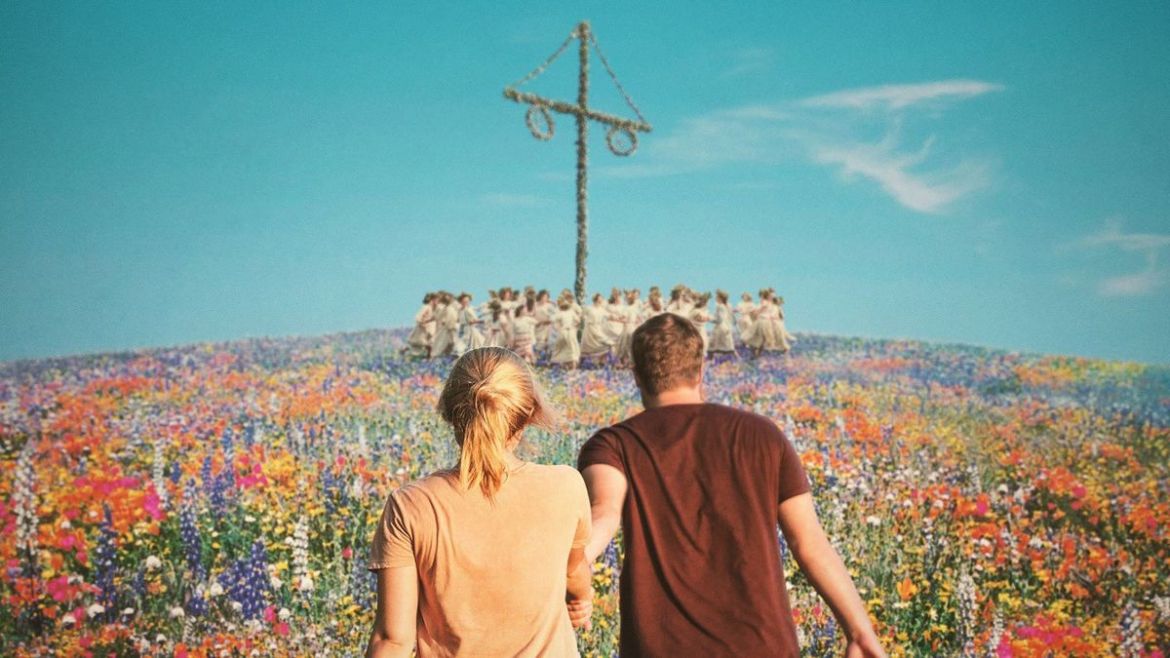
Last year director Ari Aster released Hereditary, a feature film that either terrified audiences for months or led them to decry the state of pretentious horror. Either way, Aster’s name was on everyone’s lips. When the announcement of his follow-up feature arrived with little fanfare, fans were eager and naysayers were at the ready. Would Aster unleash another tour-de-force of anxiety and fear? If you heard Jordan Peele’s declaration people were preparing for the most apocalyptic horror feature ever made. Unfortunately with hype so high the only way is down and Midsommar (that’s mid-so-MAR) hits the wall with a fizzle, not a bang.
Dani (Florence Pugh) and Christian (Jack Reynor) are mired in a codependent relationship neither one has the guts to leave. After Dani suffers a traumatic event Christian, feeling guilty, decides to invite her on a boys trip to a small Norwegian village of a friend. Once there the group discover’s the town’s midsummer festivities might have more sinister intentions.
There’s a jarring sense of before and after with Midsommar, starting with the inciting event that puts Dani and Christian on the downward spiral the movie culminates with. It isn’t enough to make the two a couple who shouldn’t be together, and everyone, including Christian’s friends, can see it. Instead the audience is treated to an anxiety-inducing opening act involving Dani and her family. The comparisons to Hereditary are most evident here and the fact the movie never properly deals with what’s set up almost seems like the director thumbing his nose at people presuming he’s a one-trick pony. That being said, it’s to the film’s benefit that the movie doesn’t rely on the anxiety of family because immediately things become too much. If you’ve ever worried about family members in the same way as Dani’s, just watching the first fifteen minutes is enough.
Aster, who based the movie on his own breakup, decides to eschew family dynamics and focus on the nature of romantic entanglements and there is plenty to be mined. Dani lives in isolation, her only friend seemingly existing on the phone. It’s evident Aster feels more for her character than Christian’s. Florence Pugh is a perpetual bundle of nerves who the movie relies on for blistering reaction shots. Watching her stave off a panic attack at every turn is heartbreaking but so commendable. I don’t know any other actress in recent memory who can hold things together until a torrent of emotions are released in a separate room. As a character Dani worries she’s too needy, even though the movie doesn’t bear that out.
If anything the main villain is Jack Reynor’s Christian, a typical bearded dude-bro who can’t tell his girlfriend his true feelings. The movie actually takes some time, not much, to look at how a man who treats women will easily screw over others and, boy, is Reynor cultivating a superb string of terrible men.
The narrative thrust though is found once the group gets to the small village of their friend, Pelle (creepily played by Vilhelm Blomgren). The Coachella memes are certainly appropriate and Aster almost seeks to employ a documentary approach as the Americans acclimate to the weird world around them. Like any stereotypical Americans the group doesn’t understand where to pee, what to each, and (especially) what not to drink. But it often feels like Aster gets wrapped up in the mythology he’s created, showing us instead of telling us what it all means. This is especially important during the film’s final frames which have all the pretension of a Terence Malick movie meets a perfume ad.
Compared to Hereditary the movie doesn’t necessarily appear to have any horror short of showcasing horrible images. That could be a claim lobbed at Aster’s earlier work but here it feels particularly apropos, especially considering how often he’ll insert rapid cuts of broken heads or other disturbing images. It’s unclear whether these are the character’s minds replaying things or just Aster trying to shock those who thought they’d avoided things by hiding behind their hands. As far as the story goes it’s laid out in a fairly formulaic way. The minute characters are brought to a location you know what will happen. At times its laughable to hear people ask “Why didn’t you tell us” to other characters, as if they can’t fathom anything bad happening.
At times its even hard to properly articulate what Midsommar is, what makes it good or bad. The film tells a story that isn’t hospitable to avoiding spoilers, while at the same time wanders from A to B reveling in the anticipation of….something. By the time the final reveals take place the movie has taken so long that the audience is anxious just to get up and move around.
In the end Midsommar is definitely an Ari Aster movie and that should be enough for you to determine whether it’s worth seeing. The images are lovely, when they aren’t utterly disgusting, but it’s hard to see it as a story you’d want to take in one sitting. Pugh and Reynor are good as a couple, but it feels like the story could have told the drama of their relationship without all the theatrics.


McKenna Rishmawy
It takes place in a Swedish village in Hälsingland, not a Norwegian village. 🙂